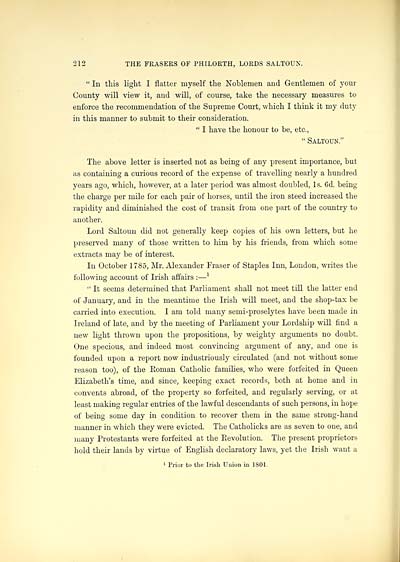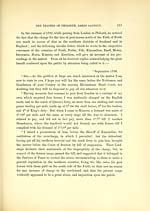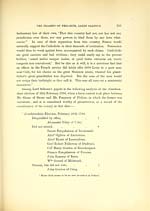Frasers of Philorth > Volume 1
(280)
Download files
Complete book:
Individual page:
Thumbnail gallery: Grid view | List view

212 THE FRASERS OF PHILORTH, LORDS SALTOUN.
" In this light I natter myself the Noblemen and Gentlemen of your
County will view it, and will, of course, take the necessary measures to
enforce the recommendation of the Supreme Court, which I think it my duty
in this manner to submit to their consideration.
" I have the honour to be, etc.,
" Saltoun."
The above letter is inserted not as being of any present importance, but
as containing a curious record of the expense of travelling nearly a hundred
years ago, which, however, at a later period was almost doubled, Is. 6d. being
the charge per mile for each pair of horses, until the iron steed increased the
rapidity and diminished the cost of transit from one part of the country to
another.
Lord Saltoun did not generally keep copies of his own letters, but he
preserved many of those written to him by his friends, from which some
extracts may be of interest.
In October 1785, Mr. Alexander Fraser of Staples Inn, London, writes the
following account of Irish affairs : — 1
" It seems determined that Parliament shall not meet till the latter end
of January, and in the meantime the Irish will meet, and the shop-tax be
carried into execution. I am told many semi-proselytes have been made in
Ireland of late, and by the meeting of Parliament your Lordship will find a
new light thrown upon the propositions, by weighty arguments no doubt.
One specious, and indeed most convincing argument of any, and one is
founded upon a report now industriously circulated (and not without some
reason too), of the Eoman Catholic families, who were forfeited in Queen
Elizabeth's time, and since, keeping exact records, both at home and in
convents abroad, of the property so forfeited, and regularly serving, or at
least making regular entries of the lawful descendants of such persons, in hope
of being some day in condition to recover them in the same strong-hand
manner in which they were evicted. The Catholicks are as seven to one, and
many Protestants were forfeited at the Revolution. The present proprietors
hold their lands by virtue of English declaratory laws, yet the Irish want a
1 Prior to the Irish Union in 1801.
" In this light I natter myself the Noblemen and Gentlemen of your
County will view it, and will, of course, take the necessary measures to
enforce the recommendation of the Supreme Court, which I think it my duty
in this manner to submit to their consideration.
" I have the honour to be, etc.,
" Saltoun."
The above letter is inserted not as being of any present importance, but
as containing a curious record of the expense of travelling nearly a hundred
years ago, which, however, at a later period was almost doubled, Is. 6d. being
the charge per mile for each pair of horses, until the iron steed increased the
rapidity and diminished the cost of transit from one part of the country to
another.
Lord Saltoun did not generally keep copies of his own letters, but he
preserved many of those written to him by his friends, from which some
extracts may be of interest.
In October 1785, Mr. Alexander Fraser of Staples Inn, London, writes the
following account of Irish affairs : — 1
" It seems determined that Parliament shall not meet till the latter end
of January, and in the meantime the Irish will meet, and the shop-tax be
carried into execution. I am told many semi-proselytes have been made in
Ireland of late, and by the meeting of Parliament your Lordship will find a
new light thrown upon the propositions, by weighty arguments no doubt.
One specious, and indeed most convincing argument of any, and one is
founded upon a report now industriously circulated (and not without some
reason too), of the Eoman Catholic families, who were forfeited in Queen
Elizabeth's time, and since, keeping exact records, both at home and in
convents abroad, of the property so forfeited, and regularly serving, or at
least making regular entries of the lawful descendants of such persons, in hope
of being some day in condition to recover them in the same strong-hand
manner in which they were evicted. The Catholicks are as seven to one, and
many Protestants were forfeited at the Revolution. The present proprietors
hold their lands by virtue of English declaratory laws, yet the Irish want a
1 Prior to the Irish Union in 1801.
Set display mode to:
![]() Universal Viewer |
Universal Viewer | ![]() Mirador |
Large image | Transcription
Mirador |
Large image | Transcription
Images and transcriptions on this page, including medium image downloads, may be used under the Creative Commons Attribution 4.0 International Licence unless otherwise stated. ![]()
| Histories of Scottish families > Frasers of Philorth > Volume 1 > (280) |
|---|
| Permanent URL | https://digital.nls.uk/96568860 |
|---|
| Attribution and copyright: |
|
|---|
| Description | A selection of almost 400 printed items relating to the history of Scottish families, mostly dating from the 19th and early 20th centuries. Includes memoirs, genealogies and clan histories, with a few produced by emigrant families. The earliest family history goes back to AD 916. |
|---|

